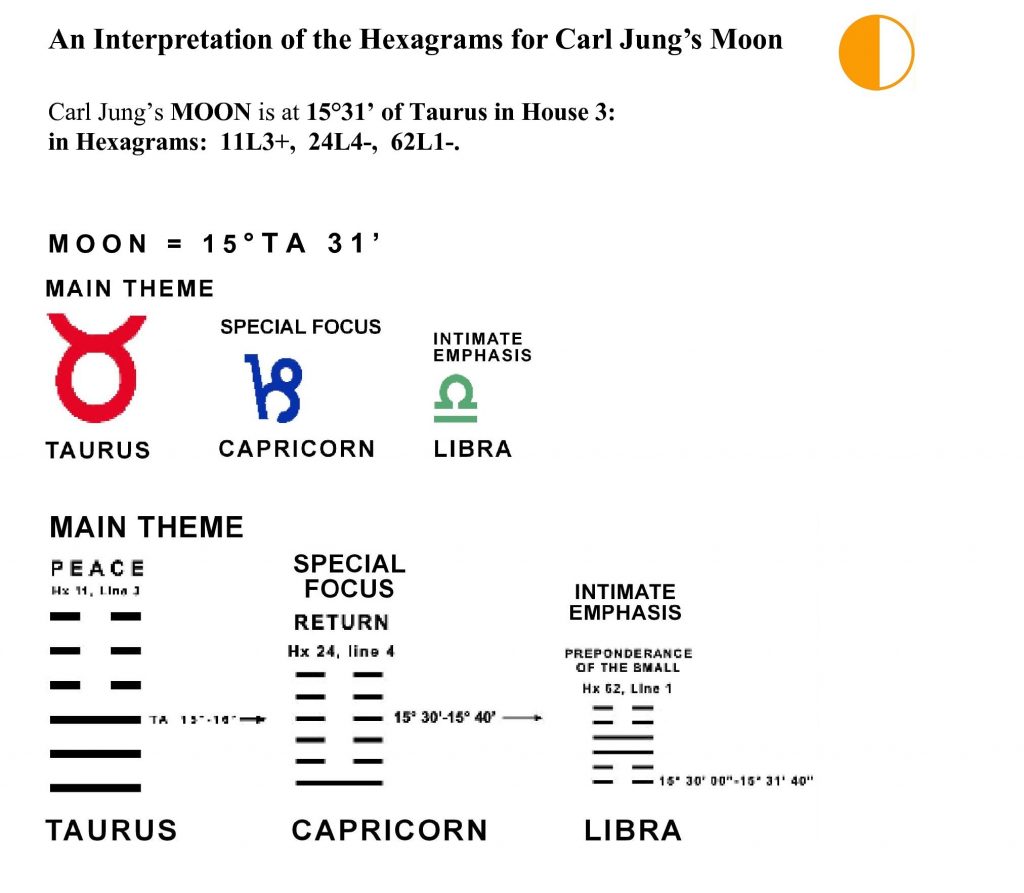
TA 15°-16° (IC) PEACE:W.11, Line 3: Active.
15° 30’-15° 40’ Cp (IC-lvl2) RETURN,THE TURNING POINT: W.24, Line 4: Yielding. 15° 30’ 00”-15° 31’ 40” Li (IC-lvl3) PREPONDERANCE OF THE SMALL: W.62, Line 1: Responsive.
Level 1: Hexagram 11: PEACE…… Line 3 + (a solid line).
Level 2: Hexagram 24: RETURN,THE TURNING POINT…….. Line 4 – (a broken line).
Level 3: Hexagram 62: PREPONDERANCE OF THE SMALL. ….Line1 – (a broken line).
The Moon
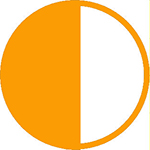
The moon represents one’s sense of security in life. It reveals the nature of your relationship to your mother. The moon shows your capacity to be nurtured or to nurture. It represents your memory and how you reflect on things. It shows how one relates to the past and often what one clings to, or brings with them from the past. Everything before this moment is past. It no longer exists except in memory. It represents the collective unconscious. The way one feels and one’s instincts or hunches are represented by the moon. Usually you don’t really know someone’s moon until you have lived with them. It reveals your basic habits and needs and the style and way one eats, sleeps and lives. It can show the type of mother that you have and the type of mother or nurturer you will be. What you feel you need for security is shown by the moon.
The zodiac sign it is in at birth shows the colouring or attitude that affects your moon or feelings. It is a qualitative influence. It is up to the individual in her or his process of development as to what level one manifests this quality as, or how positive or negative an attitude one has towards mother or the past.
The astrological house the moon is in at birth reveals the circumstances surrounding one’s need for security, or specific areas of focus or expression for those feelings.
It expresses itself easily or with difficulty according to the amount of stress that affects it, and this stress is revealed through the aspects made to the moon from other planets.
The astrological associations are fascinating and quite profound in themselves. Astrology reveals the nature and circumstances of space and time. The I Ching reveals the implications of change. Put them together and a remarkable tool evolves which offers new ways of understanding our relationship to time and place and a meaningful existence. Once one has a sense of the astrological implications, or even if you don’t and bypass that side of things, the hexagrams that the Moon is in remain vibrantly alive, waiting to be explored and studied. It promises a divine or celestial confirmation or affirmation of your life and its idiosyncrasies.
Carl Jung’s Moon is in the Zodiac sign of Taurus. This implies a rather self-determined and at times stubborn nature. He would need to be appreciated and would likely need his comforts to feel secure. He has an instinct for evaluating his circumstances and for reflecting on the real values of his memories and dreams. The moon in Taurus gives a strong sense of nature and beauty. One can get pulled between likes and dislikes, as well as attractions and repulsions. At home he would be rather predictable in his ways.
The moon is in the Third House of common sense and communications. This would make him intellectualize his feelings and express what he liked or disliked, or perhaps express what made him feel secure and what did not. It certainly implies a natural expression of his moods and feelings, and of course his reflections on dreams, motivations and memories.
The Main Theme Hexagram
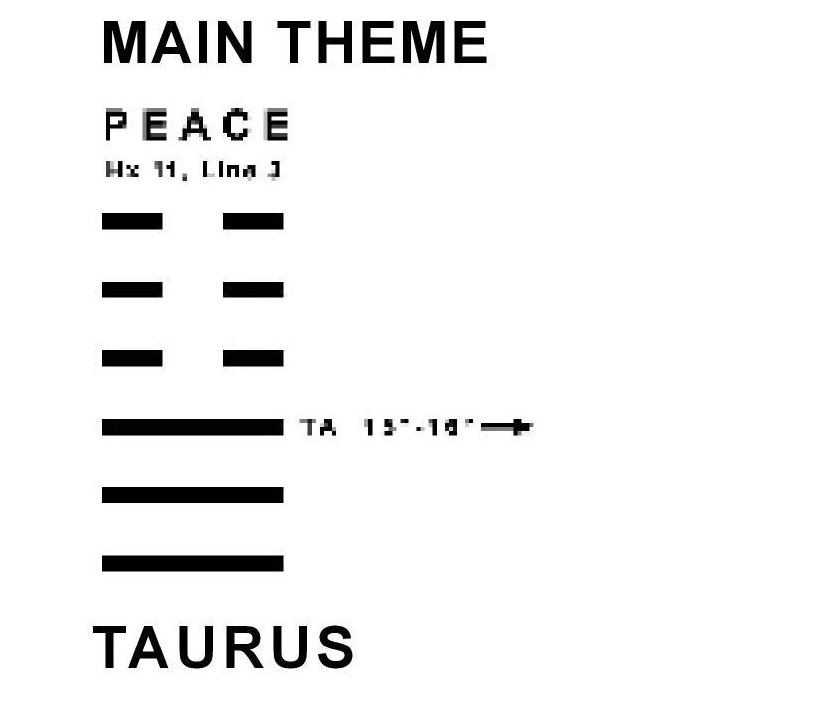
Level 1: Hexagram 11: PEACE…… Line 3 + (a solid line) active.
The Main Theme Hexagram for the Moon is Peace. The first association to this would
be that he would need peace to feel secure, to communicate, and even to write.
The first category for this hexagram is Above and Below.
ABOVE AND BELOW:
Earth above, heaven below.
Receptive without, firm within.
Acceptable force.
Creative sensitivity.
One directs individual energy towards the needs of the group.
This could imply that he would be driven by a need to express his feelings and memories in context to others. He would feel a need to teach or perpetrate a cause that reinforced his feelings and sense of security. It must have been difficult for him to stay with Freud, once he no longer valued the same ideas or conclusions.
The second category for Peace is The Image.
THE IMAGE:
Sincere action.
The right approach is important.
One must be sensitive to the needs of others.
To see the mother is favourable.
Inaction will cause failure.
A considerate initiative will be praised.
To bring appropriate gifts will ensure success.
With the Moon in his third house he felt the need to communicate sensibly and express his feelings. His gifts were his writings for which he will always be remembered. In the process he created words or used them in such a manner that they have become standards in the world today: words, like psyche, collective unconscious, synchronicity, individuation, intuition, feeling, sensation and thinking!
The second category for Peace is The Judgement.
THE JUDGEMENT
Difficulties without, sensitivities within.
There are problems to be solved.
Words of caution will not suffice.
Talk is cheap.
What is needed can be seen.
To help others furthers.
To help oneself will draw criticism.
The best leaders walk in the rear.
In this way dangers can be seen
And the vulnerable can be helped.
To be content with one’s own self worth,
One must have the welfare of others in one’s heart
And act accordingly.
The words above seem to describe the motivation and instinctive nature of Jung to help solve the problems of others. His practical Taurus moon made sure that his words were not cheap, but that they would be listened to and respected.
The next category is the Family Relationship:
FAMILY RELATIONSHIP:
The father to the mother.
He acts, she reacts.
When he acts to help, she is relieved.
He acts freely. She carries the responsibilities.
He talks. She understands.
He thinks for himself. She thinks for the family.
He is firm in his ways. She is yielding.
When he acts to make her life easier,
There will be peace in the family.
One could conclude that he would have an instinctive sense of the implications of actions.
The next category is Zodiac Considerations (Pentans).
One can do more working with others than against them.
Go out of your way to take care of others.
If your mother had not taken care of you,
Where would you be?
Little things will mean a lot.
Individual effort is needed to help the earth.
Help the earth and there will be peace and happiness.
Over everyone’s head is a different star,
But under everyone’s feet is the same earth.
Once again the theme appears about helping or working with others. His moon in this hexagram would likely make him feel impelled to do so, if only to justify his own comforts and life style. The different star over head points toward the uniquely different archetypes available in life, and the unity of the collective unconscious beneath our feet.
THE LINES:
Carl Jung’s Moon is in Line 3 + active (between 15 and 16 degrees of Taurus).
The line the Moon is in provides a special focus into how the feelings mentioned above, are ex-
pressed.
Nine in the third place: (15° – 16° Taurus) One gets one’s work done.
Now one must improve the lives of others.
Make it happen!
The meaning gives more specific advice. Once again we see an instinctive driving need to improve the lives of others. His basic motivation and mode of operation stands revealed.
The third place: 15° – 16° Taurus: 24. Return, The Turning Point
One returns
And directs one’s efforts
Towards what is really needed.
There is a level 2 hexagram that further elaborates each line of the Main Theme hexagram. There are a few lines to represent this influence here. To go deeper one should, in this case, read hexagram 24: Return, The Turning Point
There is an implication of returning to something in the past and making a new start of things.
This could be seen in his relationship to Freud, in that he may have already had the principles and understanding of synchronicity within him before he met Freud. Maybe he had to renew and revitalize his own memories, dreams and reflections.
Nine in the third place:
One works in good cheer.
If effort is needed
One will not hesitate to help.
Good fortune.
This implies that he had confidence in himself and his work habits.
The next section gives technical consideration as to why the line interpretation was made the way it was.
Technical Considerations of Line 3:
Solid in an odd place
Appropriate action
Firmness at the right time
(Astrological note: This place concerns the affairs of Houses 5 and 6)
Holding Together with appropriate energy above.
(Astrological note: Appropriate reinforcement from Houses 7 and 8)
Outer Correspondence: Approval and support from Line 6
(Astrological note: Approval and support from Houses 11 and 12)
Trigrams of Influence:
Lower Primary Lower Nuclear Upper Nuclear

A solid line in a solid place implies appropriate action with firmness at the right time. With his moon here. Jung could rely on his ability to express his feelings strongly when it was appropriate. It appears that he would not let such an opportunity pass by.
Holding Together is a technical term in the I Ching. When a solid line is next to a broken line or vice versa, they are deemed to be Holding Together. In this case Line three is appropriately active and holding together with appropriate receptive energy from the line above (Line four).
The astrological notes are quite insightful here. The third line of performance and appropriate service will hold together with the needs of relationship. It is this holding together that allows one to be appropriately firm.
Correspondence is another technical term that refers to when the bottom line in the upper trigram is the opposite of the bottom line in the lower trigram. The same holds true for the middle lines or upper lines of the trigrams above and below. It implies, in this case that line six is a broken line so that the firm action of line three can count on a corresponding support. Once again the astrological note suggests that this support will come from peers and from the realms of conscience, the domains of the 11th and 12th houses.
In writing about his memories, dreams and reflections he would find those close who will hold together with him and he would also find support for his words and conscientiousness from more distant peers.
The three trigrams influencing this line are The Creative Father, The Joyous Lake and The Arousing Force. The Creative implies strong independent action. The Joyous Lake implies joy and contentment. The Arousing Force implies a need to start things however shocking they may be. One might conclude that Carl Jung found pleasure in expressing powerful truths especially if the effect was shocking.
The Special Focus Hexagram
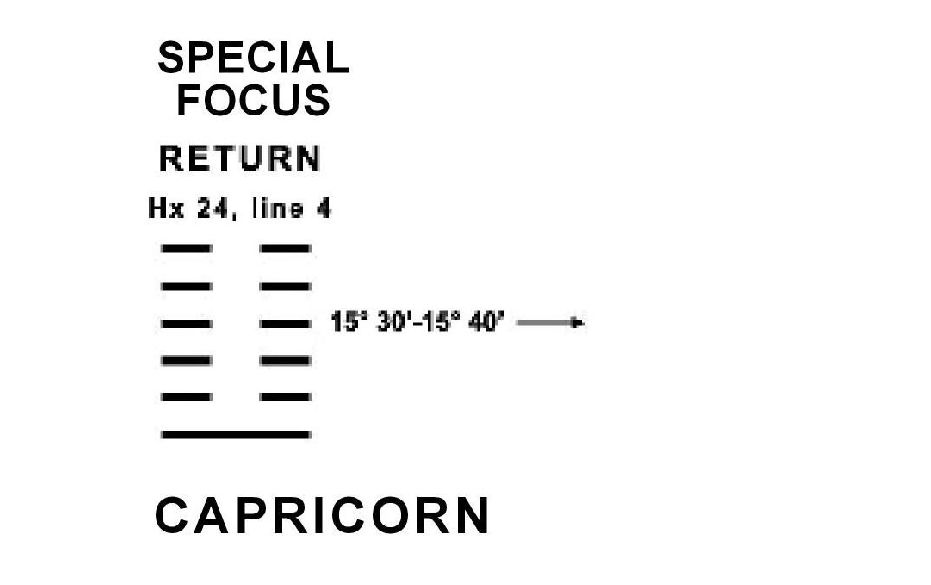
The Special Focus Hexagram will further elaborate the implications of Line 3 of Peace. We will be looking deeper into the ideas of peacefully understanding and expressing the union of father and mother (opposites) without a Freudian slant. Because his moon is here his expression is driven to explain the past, or explain in context to past associations.
The Special Focus Hexagram is:
Level 2: Hexagram 24: RETURN,THE TURNING POINT. ..Line 4 – (a broken line).
The idea arises of the need to return to establish peace. The question is return to what? What is the turning point from which one returns. Various examples could be taken from Jung’s past. Perhaps a vivid one was when he was beaten up at school and hit his head. He had fainting spells, but when he overheard his father’s concern he decided to consciously heal it himself and succeeded. A significant turning point at least. Another turning point could refer to his reassessment of his understanding compared to that of Freud’s and deciding to go his own way. The stories to validate the implication of these hexagram archetypes could go on endlessly.
The first category for this hexagram is Above and Below.
ABOVE AND BELOW:
Above is the receptive and yielding earth.
Below is arousing shock and thunder.
Movement that meets with acceptance.
The first son returns.
Here we see a shocking hidden movement within the earth, a rumbling. It could be compared to Jung’s rumblings of conscience and perhaps to his writings and their effect on the world.
The second category is The Image.
THE IMAGE:
After great stillness, movement begins.
Out of great silence – a sound!
Out of great darkness – the first trace of light.
Where one comes from can be known.
Where one will go is in the seed.
Who dares to disturb the silence?
This is a beautiful association for Jung. His feelings (moon) reached into the great silence, and observed the things that disturb the silence. He then wrote about understanding the process of returning to inner peace through the movements of individual development or individuation. At least his writings took such things into consideration.
“Where one comes from can be known” is a powerful affirmation of his feelings and beliefs. It also affirms the reality of astrology or understanding one’s horoscope …. “Where one comes from”.
THE JUDGEMENT:
One is passive without,
But something has changed within.
A new impression manifests.
A new direction has begun.
One prepares for greater change
While maintaining responsibilities.
Movement that is not noticed by others.
One’s voice will not be heard
But a first step will be taken.
In this judgement one can quite easily make the association to Jung maintaining his responsibilities to Freud, while feeling significant changes from within. His problem was how to resolve this new change and its implications as peacefully as possible.
FAMILY RELATIONSHIP:
The first son to the mother.
He acts. She watches.
He will start things. She will be shocked.
She is concerned.
But her words have little or no effect.
In the end he will return for her blessing
And help where he can.
Because of Jung’s moon being here, the temptation is to see the mother as the collective unconscious and the first son to be his separate individuated life.
The next category is Zodiac Considerations (Pentans).
The darkest days of winter.
For three days, no apparent movement.
These days sit quietly in the darkness like three wise men.
On the fourth day one can see that the light is returning.
The vision within is seeded.
It must be nurtured before it is shared.
In the sixth line (on the sixth day)
One can sense the significance of the return
But must keep conclusions to oneself.
Jung would feel that movement within must be nurtured and developed before it would be able to effect outer changes. In his striving for peace and security he would feel the need to withdraw and gather his ideas together and nurture his insights before putting them out. There is little doubt that Jung deliberated and reflected on his shocking new ideas before presenting them academically.
THE LINES:
The line accentuated in this second hexagram of Return, The Turning Point is the fourth line. This line gives a Special Emphasis within the theme of Return as a whole.
Six in the fourth place: (03° – 04° Capricorn)
Outside of your immediate circle.
Understanding will come.
Be patient.
With his moon here, Jung took the time to nurture and develop his ideas. He knew they would be shocking so he cautiously prepared a way for his peers to be able to understand
He also took the time to express himself in such a way as to nurture others. Outside of his inner circle, understanding has come and is continuing to do so even after his death.
The fourth place: 03° – 04° Capricorn: 62. Preponderance of the Small.
The bird is on the wing.
It should not fly too high.
It should not reach beyond its limits.
Assumptions should not be made.
Jung did not try to fly too high, although some would debate this point. He maintained his therapeutic counseling, relevant educational positions and organizational commitments throughout his life to maintain his approach and ideas. He took the time to be known for his perceptions rather than his assumptions. He could contact the collective unconscious within the limits of his own life and those of his clients.
Six in the fourth place:
One listens and watches.
No one will be confided in.
No one will be disturbed.
No blame.
What does a psychologist do but listen and watch? Care is needed in not imposing one’s archetypal experiences or feelings into the psyche of another. There is a force at work on its own here. One only needs to listen and watch. Certainly one cannot be blamed for this.
Technical Considerations of Line 4:
Broken in an even place
Appropriate receptivity
Yielding at the right time
(Astrological note: This place concerns the affairs of Houses 7 and 8)
While the main theme of Peace showed appropriate firmness at the appropriate time, here within the Turning Point, we have appropriate receptivity at the appropriate time. What a wonderful quality for a therapist or counselor. Jung realized what he was up against and took his good time in making his word heard. In so doing he anchored the furtherance of his style of therapy and understanding into the world.
The affairs of the 7th and 8th houses are the affairs about relationships and the shared responsibilities that arise from them.
No Holding Together
This seems to apply to the fact that Jung had to persevere on his own without being able to hold onto some associations, like he had to Freud. He made his moves within while maintaining the greater peace without.
Inner Correspondence: Approval and support from Line 1
(Astrological note: Approval and support from Houses 1 and 2)
This means that there is a solid line in the 1st place balancing the passiveness of this line. It would give him the patience to wait for the changes to be noticed in the appropriate time. It was enough that he could feel and sense progress.
Trigrams of Influence:
Lower Nuclear Upper Nuclear Upper Primary

This line is 1st line of the Receptive and the 2nd line of the Receptive and the 3rd line of the Receptive trigram. This implies a great sensitivity to others and a significant ability to be receptive and listen.
The Intimate Emphasis Hexagram
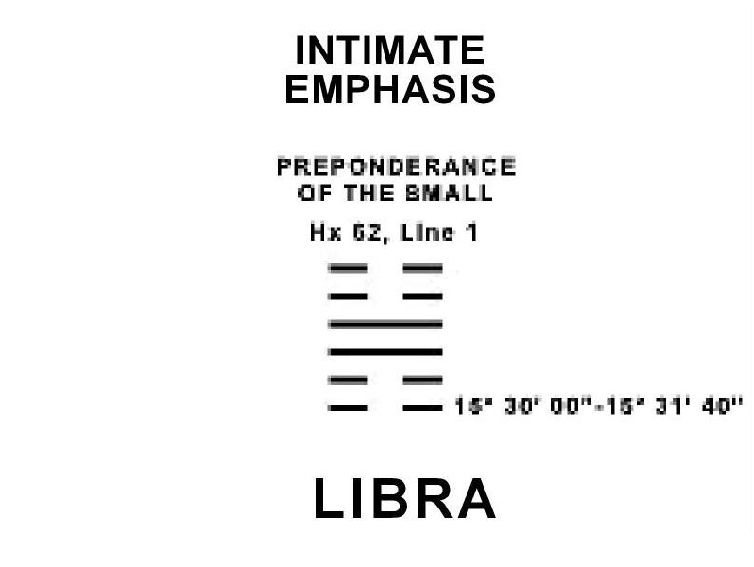
Level 3: Hexagram 62: PREPONDERANCE OF THE SMALL.Line1-(a broken line).
The Intimate Emphasis Hexagram is the most personal accentuation. It is because of this per-
sonal intimate emphasis that many people easily relate to this level of interpretation.
The Intimate Emphasis Hexagram is Preponderance of the Small. (Line 1-)
Jung was able to sense the implications of small ordinary people and how they were being affected by the vast collective unconscious in their daily lives and emotions.
ABOVE AND BELOW:
Thunder above, the mountain below.
The arousing force without and stillness within.
Sudden change is threatening.
One will wait until one is ready.
To rush ahead would be folly.
Get yourself together before you move.
Jung having been university educated would be well aware of the storms that his approach would cause in his academic community. (Freud too had great adversity to his concept of sexuality in children.) Jung’s association to mystical, occult and primitive ways stood to stand in the way of his credibility. While continuing the study of such matters, he held them in for a long time preventing extensive clashes over the issue. In his own way he really championed these areas of interest and established them on new levels of acceptance. His introduction to the Richard Wilhelm’s I Ching, or Book of Changes, introduced divination in the context of synchronic-ity and ushered in a new wave of people studying the I Ching. His concepts made the seemingly unreachable reachable to the western mind.
THE IMAGE:
Thunder on the mountain.
Movement is demanded.
One cannot see.
There is no secure footing.
Find a resting spot.
Secure your safety.
A bird on the wing,
Flies through the air.
Nothing above, nothing below.
Still it would be dangerous to fly higher!
It is wiser to stay close to the nest!
To most of his contemporaries Jung had no foundation to stand on, nor could he see concretely what he was dealing with. He was like a bird on the wing. He flew his own course. He survived and continually wrote. Through his writings he passed on his insights and opened a new-old way for modern man.
THE JUDGEMENT:
Outer stimulation, inner restraint.
The mind is active, while the body is still.
Creative everywhere
But not well received.
One draws attention to oneself
Before securing relationships.
To speak will cause shock and disturb the peace.
One must be cautious about expressing excitement.
Once again, this is a theme that reoccurs in Jung’s life. Creative everywhere but not well received. His worth has been growing steadily since his death. His manner of writing was fascinating but certainly he was cautious in expressing excitement. His moon in Taurus added to his capacity to deliberate and maintain his course. He would naturally have a good sense of what he had to deal with.
FAMILY RELATIONSHIP:
The third son to the first son.
The third son keeps still.
The first son is the arousing force.
The third son waits calmly.
The first son is shocking like thunder.
The third son will listen, but will be slow to follow.
The first son will act on impulse.
He will tell his younger brother what to do.
The third son will not keep up with the first son.
He will consider the implications and rest content with simpler actions.
The third son will be difficult to get out of the house.
The first son will be quick to leave.
According to Jung, there were several distinct personalities within him. Perhaps they would mirror these family relationships.
ZODIAC CONSIDERATIONS:
The body sits still but the mind does not!
One thinks of noble things to do,
But one must be patient.
If one feels supported, one will take the lead.
If one becomes proud of what one knows,
One will lose the foundation.
It would be wiser to encourage others to lead.
Certainly, Carl Jung has encouraged a whole generation of psychotherapists to take the lead and carry on their work with the collective unconscious and its presence in the process of individuation.
LINE 1:
Six in the first place: (18° – 19° Libra)
One sits erect and still
Trying not to think.
One breathes.
One loses one’s sense of time.
Perhaps this relates to Jung in his Tower, his place of retreat and isolation. Perhaps it could refer to the very essence of the collective unconscious, that it can induce a sense of losing time or being beyond time.
The first place: 18° – 19° Libra: 32. Duration
If one tries to lead, one will be distracted.
There are inner teachings and established ways.
If one can listen one will benefit.
Here one thinks of Jung’s visiting tribal cultures and discovering long established inner teachings, like those on alchemy, astrology, the I Ching and eastern religions.
Six in the first place:
Reserved and withdrawn
One does not make a good first impression.
One’s timing is off.
Confidence is lacking.
This is an interesting point. If one understands Jung’s introverted studies and nature, it could be seen as reserved and withdrawn. Certainly he embraced these possibilities when he could. In terms of his timing being off it could point to why it took so long for him to get recognition. This delay in outer presentation was the very factor that allows for the development of his depth. Who goes on their inner search if they are totally confident in themselves? The unknown is just that, unknown. A wary approach is well advised. On top of this most of his interests would have been severely put down. There is of course a difference between inner experience and outer confidence.
Technical Considerations of Line 1:
Broken in an odd place
Inappropriate receptivity
Yielding at the wrong time
(Astrological note: This place concerns the affairs of Houses 1 and 2)
No Holding Together
Outer Correspondence: Approval and support from Line 4
(Astrological note: Approval and support from Houses 7 and 8)
Trigrams of Influence:
Lower Primary

It is questionable whether it would have been more appropriate for Jung to be more assertive. It is enough to see that there was cause for being misconstrued or misinterpreted. He might not have felt like challenging the world. As a young man this inappropriate sensitivity might have been more noticeable. Perhaps this showed as a simple reserve or humility in his manner? Yielding at the wrong time sits as a puzzle to this author. Perhaps it relates to health matters?
No holding together implies that there was no support for his feelings (moon)
Outer Correspondence: In line four which relates to the astrological seventh and eighth houses, the focus is on relationships and the energies of togetherness. This points to a positive ability to express his feelings and understandings of relationships.
